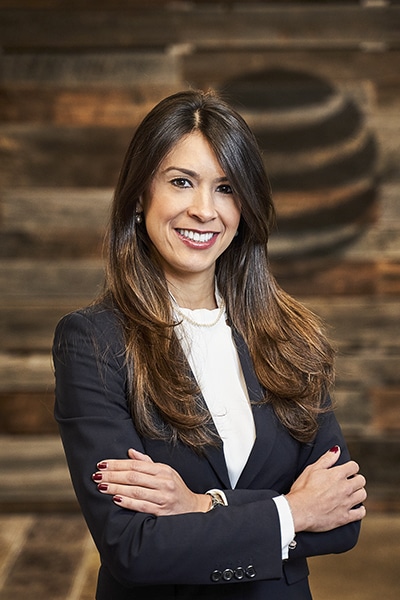|
Getting your Trinity Audio player ready...
|
Ingrid Berner has a lot on her mind. As vice president of international tax for AT&T, she oversees more than 100 jurisdictions with the support of a team composed of 110 members located in more than 20 countries around the world. She is responsible for all tax-related matters on those jurisdictions, which includes ensuring that more than 40,000 tax returns are filed each year, leading tax audit management, and supporting the company’s endeavors across all of its different business units.
But recently, both Berner and AT&T as a whole have been working to simplify and streamline the international tax division’s operations. Even if that means turning everything they know on its head. Her mission? Providing world-class tax service to AT&T, its shareholders, and its customers.
A native of Brazil, Berner initially trained as an attorney at the Universidade Presbiteriana Mackenzie. But upon graduating in 2004, Berner made a decision about her continued education that many would call unusual for the field—a decision to pursue not one, not two, but three master of laws (LLM) degrees in both Brazil and the United States.
“I think a lot of people would disagree with me, but I strongly believe that a master’s degree can help a lot, not only via career growth but all other aspects of your life,” Berner says. “It helps you think faster and outside the box. I totally agree with Benjamin Franklin when he said, ‘An investment in knowledge pays the best interest.’”

Those abilities have certainly served Berner well at AT&T, the largest communications company in the world and the parent company for renowned media and technology companies such as DirecTV and WarnerMedia Group.
Since starting at the company as regional tax executive director in 2015, Berner has continued to broaden her knowledge of AT&T’s tax organization as assistant vice president of tax and now as VP of international tax. In that capacity, Berner is responsible for all tax matters in each country where AT&T has a presence. “But I’m also responsible for supporting all of the businesses in those jurisdictions and helping make sure that AT&T can do business in those areas, no matter the economy or regulatory environment,” she notes.
“In my five years at AT&T, I have been involved in various projects and had the opportunity to work with different groups across the organization, but what I am really passionate about is teamwork. When I joined as VP of international tax, I had the challenge to integrate the teams that we had inherited on the acquisitions of different business in different countries, with different technical backgrounds and different perspectives,” Berner recalls. “It was clear to me that if we were able to leverage our teams we would be able to drive cost synergies, while also implementing consistent policies to manage tax across our different businesses.
“The tax organization has a long-standing reputation within AT&T of delivering significant shareholder value,” Berner continues. And in less than two years in her role as VP of international tax, Berner has found a novel way of ensuring and optimizing that value.
“With the recent WarnerMedia merger, the increase in our global footprint, and its related international revenue, our international operations have gained a whole new significance and relevance to our organization.”
To realize this aim, Berner has transformed the international tax organization. “We are now structured by region, not business. I don’t have one tax leader for Warner Brothers, another leader for HBO, and a third leader for AT&T Legacy,” Berner explains. “Rather, I have one single leader per region who is responsible for supporting all of the businesses operating in that region.”
Under this new system, Berner says, each tax team works closely with all other AT&T teams in its region, from the marketing and treasury teams to the accounting and legal departments.

“My teams and I support those areas and help them launch their products,” says the VP, “not only from a tax strategy perspective, but also in terms of the local regulations, the structure of new services, our relationships with local tax authorities, and the legislative changes going on in those countries.”
But keeping current on all those legislative changes can be quite challenging, Berner says. “It’s one of my responsibilities to make sure that my teams are keeping track of how those changes would impact our business, and I rely on my team to get those updates,” she offers. “I need to trust my team. When there is trust, appreciation, and respect, communication is easy and effective.
“Managing taxes on a global scale is no easy feat,” Berner acknowledges. Still, her leadership style seems to help a lot with that type of environment. Berner is not afraid of challenging the status quo; to her, different results require different approaches. “We won’t achieve the goals if we keep doing the same.”
That initiative is both respected and praised by the partners with which Berner works at AT&T. “Through trust and innovation, Ingrid has transformed the global tax team,” explains Janet Moran, Deloitte’s global lead tax principal for AT&T. “She encourages a culture of collaboration by addressing tax considerations spanning multiple business units. She has created efficiencies through process improvement and automation. Ingrid optimizes the value the tax team brings to its stakeholders.”
Innovation and technology are extremely relevant to Berner. The tax area is well known for its bureaucratic and manual processes, especially in regard to the international world. Tracking down information from each of the systems used in AT&T’s jurisdictions and dealing with different accounting principles, as well as unique legislation in each country, is part of the job, Berner says.
This year, though, the company is setting out to change all that.
“We’re putting in place an automation project that will allow us to enhance our tax accounting software—as well as our workflow and data storage software—implement a tax compliance dashboard, and automate some of our tax reports,” Berner says. “Basically, the idea is that we will be able to create one single ledger for all the different businesses: we would be able to push a button and instantly get the information we need.
“The project should take anywhere from six to eight months,” Berner adds, “but it is very much going to be worth it in the end.”

